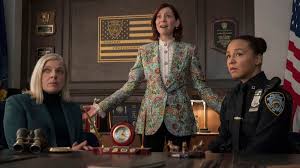
The Gentle Current and the Unseen Tide: How Elsbeth's Politics Are Stealthy But Strong
Carrie Preston, with her characteristic wit and insight, perfectly encapsulated the subtle genius of her titular character’s new show: “The political undertones in Elsbeth are stealthy but strong.” This seemingly paradoxical statement speaks volumes about the series' approach to social commentary, weaving critiques of power, justice, and societal norms into the fabric of its whimsical, procedural charm. It suggests a political consciousness that doesn't shout from the rooftops but rather permeates the very air its characters breathe, making its impact all the more profound for its understated delivery.
The "stealthy" aspect of Elsbeth's politics lies in its ingenious integration into the show's primary objective: entertainment. At its surface, Elsbeth is a delightful fish-out-of-water story. Elsbeth Tascioni, the eccentric lawyer with an uncanny knack for observation, is transplanted from Chicago to New York City, ostensibly as an outside observer of police conduct, but inevitably finding herself embroiled in intricate murder investigations. The show’s narrative priority is the "howdunit," the delightful unraveling of a clever crime by an even more clever, albeit quirky, detective. The tone is often light-hearted, almost buoyant, characterized by Elsbeth’s whimsical outfits, her disarming curiosity, and the vibrant tapestry of New York’s elite. The political commentary is rarely, if ever, the explicit plot driver. There are no grand monologues about systemic injustice, no on-the-nose exposés. Instead, it’s a whisper, a suggestion, a shade of meaning painted into the background of each case.
Yet, beneath this charming façade, the "strong" current of political undertones flows with undeniable force. These undertones manifest in the very fabric of the crimes Elsbeth investigates and the perpetrators she unmasks. More often than not, the villains are figures of privilege and power: self-serving media moguls, cutthroat theater directors, wellness gurus exploiting their followers, or elite athletes manipulating the system. Their motives frequently stem from a desire to protect their carefully constructed empires, their reputations, or their unearned advantages. In exposing their machinations, Elsbeth subtly critiques the insidious ways in which wealth, influence, and celebrity can corrupt, allowing individuals to operate above the law or manipulate public perception for personal gain.
Consider, for instance, a case involving a celebrity chef who orchestrates a murder to protect his brand, or a powerful real estate developer who eliminates an obstacle to a lucrative deal. The show isn't just about catching a killer; it's about dissecting the environment that fosters such criminality. It shines a gentle but persistent light on the vulnerabilities of a justice system that can be swayed by public opinion or the powerful influence of a well-connected individual. Elsbeth, herself an outsider, often triumphs precisely because she doesn't subscribe to the unwritten rules of the elite, seeing through the carefully constructed facades that others, accustomed to these circles, might overlook. Her very presence, a quirky, unassuming woman consistently outwitting the arrogant and powerful, is a quiet political statement in itself – a testament to the idea that true insight and justice can come from unexpected places, challenging established hierarchies and assumptions.
The brilliance of this "stealthy but strong" approach lies in its effectiveness. By embedding its critiques within engaging, character-driven narratives, Elsbeth allows its political commentary to bypass the potential defensiveness that overt messaging often provokes. Viewers are entertained by the puzzle, charmed by Elsbeth, and in doing so, they absorb the underlying message almost subliminally. It’s like a sugar-coated pill: the sweetness makes it palatable, but the medicine still does its work. The show prompts reflection not through didactic pronouncements, but through vivid illustration. We see the consequences of unchecked ambition, the fragility of truth in a media-saturated world, and the subtle abuses of power played out in compelling, human-scale dramas.
In essence, Elsbeth operates like a Trojan horse of social commentary. It enters the cultural landscape as a delightful procedural, its outward appearance non-threatening and appealing. But within its charming exterior, it carries potent observations about the world we inhabit. Carrie Preston's insight reminds us that the most impactful political statements are not always those shouted loudest, but often those woven most artfully into the stories we tell, allowing the gentle current of narrative to carry the unseen tide of truth.
